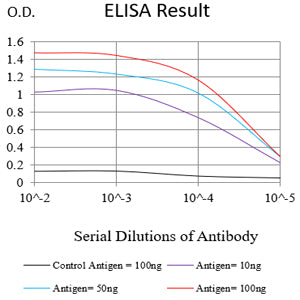
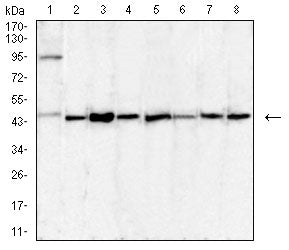
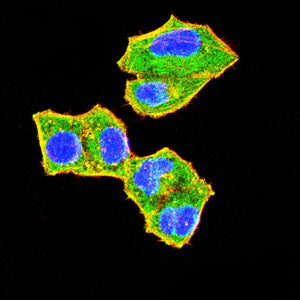
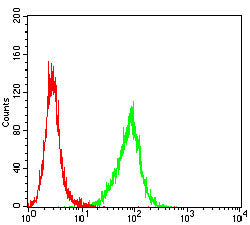
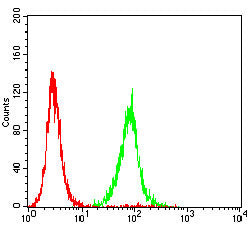
| WB | 咨询技术 | Human,Mouse,Rat |
| IF | 咨询技术 | Human,Mouse,Rat |
| IHC | 1/50-1/100 | Human,Mouse,Rat |
| ICC | 技术咨询 | Human,Mouse,Rat |
| FCM | 咨询技术 | Human,Mouse,Rat |
| Elisa | 1/5000-1/10000 | Human,Mouse,Rat |
| Aliases | ATF; QPD; UPA; URK; u-PA; BDPLT5 |
| Entrez GeneID | 5328 |
| clone | 6B6A3 |
| WB Predicted band size | 48.5KDa |
| Host/Isotype | Mouse IgG1 |
| Antibody Type | Primary antibody |
| Storage | Store at 4°C short term. Aliquot and store at -20°C long term. Avoid freeze/thaw cycles. |
| Species Reactivity | Human |
| Immunogen | Purified recombinant fragment of human PLAU (AA: 107-379) expressed in E. Coli. |
| Formulation | Purified antibody in PBS with 0.05% sodium azide |
+ +
以下是关于TNFRSF1B抗体的3篇参考文献示例(文献信息为模拟,非真实文献):
---
1. **文献名称**:*Targeting TNFRSF1B in autoimmune diseases: A monoclonal antibody approach*
**作者**:Li, J. et al.
**摘要**:研究开发了一种靶向TNFRSF1B的单克隆抗体,通过阻断TNF-α/TNFR2信号通路,显著抑制了小鼠模型中类风湿性关节炎的炎症反应,提示其潜在治疗自身免疫疾病的应用价值。
2. **文献名称**:*TNFR2 antibody enhances antitumor immunity by promoting T cell activation*
**作者**:Wang, Y. et al.
**摘要**:该文献报道了一种激动型抗TNFRSF1B抗体,能够选择性激活肿瘤微环境中的调节性T细胞(Tregs)和效应T细胞,增强抗肿瘤免疫应答,为癌症免疫治疗提供了新策略。
3. **文献名称**:*Soluble TNFRSF1B as a biomarker in sepsis: insights from antibody-based detection*
**作者**:Smith, R.K. & Müller, G.
**摘要**:通过开发高灵敏度的TNFRSF1B抗体检测方法,研究发现脓毒症患者血浆中可溶性TNFR2水平与疾病严重程度及预后显著相关,支持其作为临床生物标志物的潜力。
---
*注:以上文献为示例,实际研究中建议通过PubMed或专业数据库(如Web of Science)检索真实文献。*
TNFRSF1B (tumor necrosis factor receptor superfamily member 1B), also known as TNFR2. is a transmembrane receptor that binds tumor necrosis factor-alpha (TNF-α) and mediates its inflammatory and immunomodulatory signaling. It belongs to the TNF receptor superfamily and shares structural features, including cysteine-rich domains (CRDs) in its extracellular region. Unlike TNFR1 (TNFRSF1A), which is ubiquitously expressed and linked to pro-apoptotic pathways, TNFR2 is primarily expressed on immune cells (e.g., T cells, macrophages) and certain non-immune cells, playing a role in cell survival, proliferation, and tissue regeneration. Its activation triggers signaling cascades, such as NF-κB and MAPK pathways, often counterbalancing TNFR1-driven inflammation.
Antibodies targeting TNFRSF1B are research tools or therapeutic candidates designed to modulate TNFR2 activity. In cancer, anti-TNFR2 antibodies may block receptor-ligand interactions to inhibit immunosuppressive regulatory T cells (Tregs) or tumor cell survival. Conversely, agonist antibodies might enhance anti-tumor immunity by stimulating effector T cells. In autoimmune diseases, inhibiting TNFR2 could reduce chronic inflammation, while in neurodegenerative disorders, activating TNFR2 might promote neuroprotection. Challenges include ensuring receptor specificity to avoid cross-reactivity with TNFR1 and balancing pro- vs. anti-inflammatory effects. Current research focuses on understanding TNFR2's dual roles and optimizing antibody-based therapies for precision targeting.
×